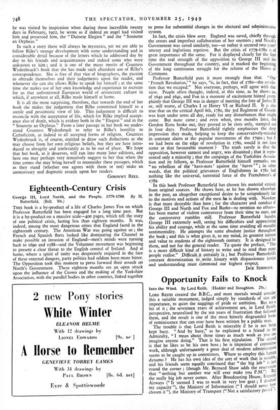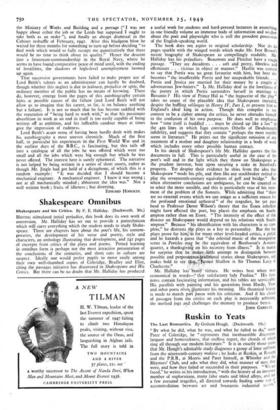Opportunity Fails to Knock
Into the Wind. By Lord Reith. (Hodder and Stoughton. 255.)
LORD REITH created the B.B.C., and most mortals would consider this a suitable monument, judged simply by standards of size and importance, to quiet the naggings of pride or ambition. But not a bit of it ; the seventeen years of achievement are, in Lord Reith's perspective, neutralised by the ten years of frustration that followed them, and the result is one of the most bitterly disgruntled books of reminiscence that can ever have been written by a public man.. The trouble is that Lord Reith is miserable if he is not being kept busy. "And by busy," as he explained to a friend in the Admiralty, "1 mean about three times as much work as you an imagine anyone doing." That is his first stipulation. The second is that he likes to be his own boss ; he is impatient of committee work, although unfortunately a great deal of modern administration seems to be caught up in committees. Where to employ this hurnall dynamo ? He has his own idea of the sort of work that is suitabk, and his friends seem equally convinced that "the big job" is lust round the corner ; (though Mr. Bernard Shaw adds the reservation that "nothing but another war will ever make you P.M."). BU the really big job never comes. After Broadcasting House, Impale! Airways (" It seemed I was to work in very low gear ; I doubted my capacity "), the Ministry of Information (" I should never haw chosen it "), the Ministry of Transport ("Not a satisfactory period"),
the Ministry of Works and Building and a peerage (" I was not happy about either the job or the Lords but supposed I ought to take both as an order "), and finally an abrupt dismissal in the Cabinet reshuffle of February, 1942. After this bludgeon blow he waited for three months for something to turn up before deciding "to find work which would so fully occupy me quantitatively that there would be no time to think about its quality." Hence the descent Into a lieutenant-commandership in the Royal Navy, where he seems to have found comparative peace of mind until, with the ending Id hostilities, the shadows of high-level unemployment loomed up again. That successive governments have failed to make proper use of Lord Reith's talents as an administrator can hardly be doubted, though whether this neglect is due to jealousy, prejudice or spite, the ordinary member of the public has no means of knowing. There do, however, emerge from the pages of this autobiography certain hints at possible causes of the failure (and Lord Reith will not allow us to imagine that his career, so far, is on balance anything but a failure). It is not so much that he has become saddled with the reputation of "being hard to work with," as that his passionate absorbtion in work as an end in itself is too easily capable of being written off as ambition, and his inflexible candour must at times give the impression of rudeness. Lord Reith's acute sense of having been hardly dealt with makes his autobiography a most uneven chronicle. Much of the first half, in particular his experiences in the First World War and in the earliest days of the B.B.C., is fascinating, but this tails off into a catalogue of all the jobs he was offered which were too small and all the jobs which were big enough but which he was never offered. The interest here is surely ephemeral. The narrative is not helped by being written in a series of short snorts, rather as though Mr. Jingle had got hold of a dictaphone, of which this is a random example: "it was decided that I should become a mechanical engineer. A mechanical engineer. I knew it was wrong ; not at all mechanically minded ; abhorrent the idea was." Not a well written book ; fruits of idleness ; but diverting.
EDWARD HODGKIN.







































 Previous page
Previous page